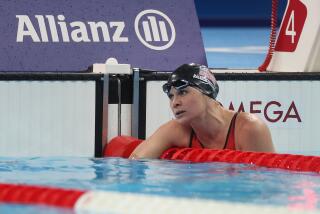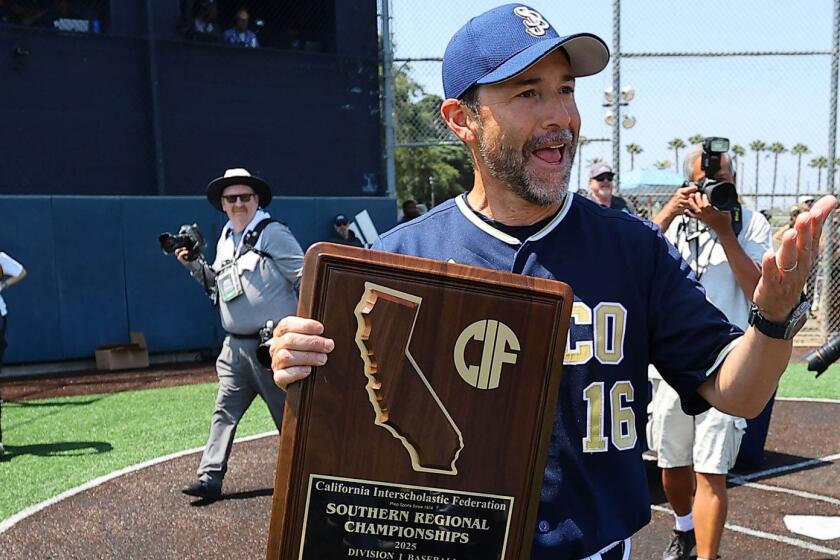There’s No Need to Feel Sorry for Herman : Despite Disabililty, San Diego Swimmer Holds Seven National Records
- Share via
SAN DIEGO — Anne Herman would appreciate it if people would stop feeling sorry for her.
She’s a mother. She can cook. She can take care of herself. And she can swim.
But people tend to see only one thing about Herman--the wheelchair she occupies.
“A lot of the general public is not aware of disabled people because they are not in contact with us,” she said. “It can create a negative attitude because people feel sorry for disabled people. They don’t know that a large majority of disabled people have jobs and families and are involved in sports.”
Among the disabled, Herman is a national-class swimmer. Her accomplishments will be part of a display in the disabled athletes’ section of the San Diego Hall of Champions, which opens on Saturday.
Herman, 35, has been involved in swimming since she took lessons at the age of six. She was a lifeguard and Red Cross swimming instructor in high school.
However, one night during her first year at Western Michigan University, her life was turned upside down.
She was coming home from a party with her date on a rainy Michigan evening when their car skidded off the road. The car overturned twice before landing on its wheels, and Herman was thrown from the car. She suffered a broken neck and spinal cord injury that left her paralyzed from the chest down.
Though Herman still had use of her arms, her doctor told her that she would not swim again because she would not have trunk control.
“I was angry about what the doctor said, but I figured I would still give swimming a try,” she said. “I was concerned about a lot of things--dating, swimming and going back to school. There was a paraplegic in the hospital, and he told me about wheelchair sports.”
Herman could only dream about wheelchair sports for the next year. She spent six months in the hospital, then went home for three months before she returned for three more months of therapy.
“I was worried that I would never walk again,” she said. “They never told me that I might not walk again, which they should’ve. After a while, I caught on.”
Herman’s mother, Mary Lou McLogan, knew the consequences.
“I wasn’t worried about whether she would swim,” McLogan said. “I wanted her to walk. We didn’t realize at that time that most quadriplegics didn’t swim. Because she was a strong swimmer and knew all the strokes, she was able to do it again.”
But it wasn’t easy. It was like learning to walk again.
“At first, I was real scared,” she said. “I was very slow in the water. Eventually, I started getting stronger. My coach let me go at my own pace.”
But life was going at a slow rate in other ways.
Herman wondered how the world would accept her after she graduated from college. She was depressed her entire senior year.
“I was afraid of going out in the cruel world,” she said. “I didn’t know what it would be like. At that time, mental health was kept in the closet more than it is now. We had few mental health counselors at the time. Except for that one depressing year, I have had a terrific life.”
After college, Herman discovered she could make it in the world. She has been a rehabilitation counselor, educational and recreational instructor and social worker.
She married her husband, Paul, a paraplegic, in 1977. They have a four-year-old son, Donald.
Herman also counts her swimming feats among her blessings in life.
She has set seven national records for disabled swimmers in the past 10 years. At the state meet last year, she won the backstroke, breaststroke, butterfly and freestyle.
Now, she keeps in form at a twice weekly swimming class for the disabled at Mesa College.
“If I can swim two or three times a week, I’m in a good mood for the rest of the week,” Herman said. “It takes all of my frustrations away.”
Or at least most of them. Herman still is frustrated by the way people approach her.
“Sometimes, kids are afraid of people in wheelchairs,” she said. “If a kid sees you in a wheelchair and shows their parents, the parents will hush them up. That creates a negative attitude in the kids.
“Sometimes, that’s embarrassing to me because I know it’s embarrassing to the parent. If the child asks, I’ll tell them what happened to me. I’ll tell them I can’t walk but that I can swim and cook and have fun with my son.”
More to Read
Go beyond the scoreboard
Get the latest on L.A.'s teams in the daily Sports Report newsletter.
You may occasionally receive promotional content from the Los Angeles Times.










